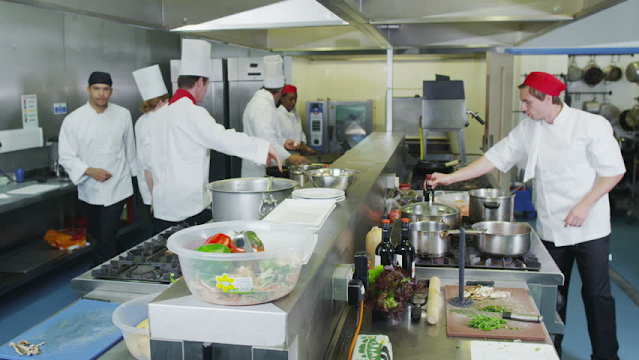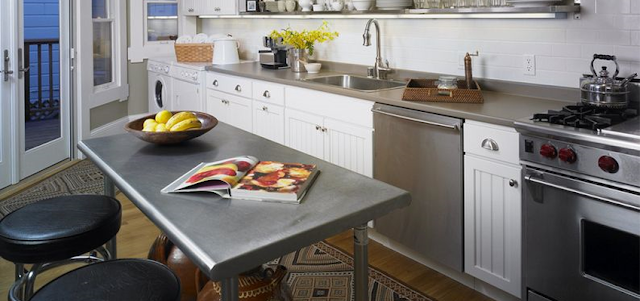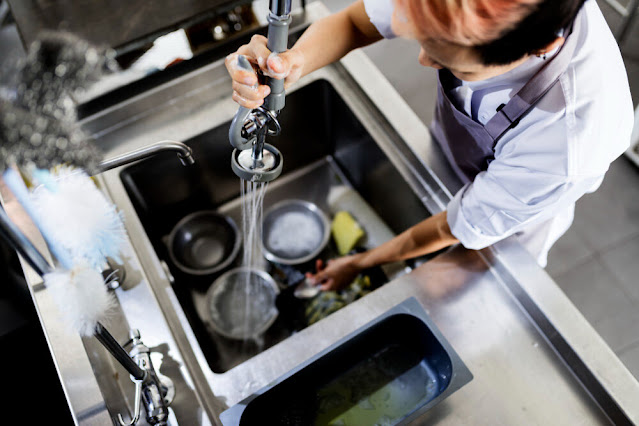Stainless steel – the best alloy for commercial kitchen equipment
Stainless steel is a generic term used to describe a range of steel types with higher resistance to corrosion. Steel is subject to quick corrosion owing to its core element, iron, which naturally occurs in combination with other elements. During manufacturing, all the impurities are artificially removed from iron, which makes steel more resilient than iron. But it is still prone to corrosion.
Stainless steel is an
alloy where elements like nickel, chromium, and molybdenum are added with iron
to increase the natural resistance of the metal against corrosion. Chromium
forms chromium oxide and it creates a protective barrier on the surface of the
metal which prevents corrosion triggered by moisture and air. So, when you buy
a stainless steel sink it serves you years
without rust. Now, depending on the percentage
of the other metals mixed with iron, corrosion resistance and resilience varies
considerably.
Why this alloy is the
best for your kitchen?
When it comes to
commercial kitchens, stainless steel made equipment gives an edge. The
following are the best reasons, why it should be your first choice,
Corrosion resistant – The
good quality variants are highly resistant to corrosion which not only adds to
the life of the equipages but also ensures a clean and hygienic cooking space.
So, if you are spending on a good quality stainless steel shelve it will
give you long service without interruption.
Heavy duty – These are
built for heavy-duty use. They are ideal for large scale cookhouses where a
huge quantity of food is prepared daily. The resilience and durability are best
suited for heavy-duty use and they can offer service for years without any
breakdown, which is very important for commercial food businesses.
Sleek look – They enjoy a
naturally stylish and smart look which enhances the total aesthetics. If your
restaurant plan has an open kitchen, these equipages should be your primary
consideration as they offer the best service without compromising on the
aesthetics.
Easy to maintain –
Another benefit that makes this alloy ideal for commercial purposes. Gears made
with it is easy to clean and maintain. In large scale cookhouses, where food is
prepared in high volume on a day to day basis, maintenance is an important
factor and this metal alloy makes it simple.
Different types used in
commercial kitchen equipment
In professional cooking
equipment stainless is always preferred because of its resilience and strength
that perfectly meets the heavy-duty needs of commercial cookhouses. But every variety
of the alloy is not the same, though they might look alike. Depending on the
metals and their percentage used in making, quality and longevity can change
drastically. Three types of stainless steel are commonly used in fabricating
commercial kitchen tools and appliances,
304 – It is a
high-quality variant that is made with 18% chromium and between 8% to 10.5%
nickel. It is highly resistant to corrosion, resilient to weathering, and is
ideal for any heavy-duty kitchen equipment including the stainless steel
benches, which often take the most beating. It is resistant to temperature
variations, strong, durable, easy to clean, and maintain.
316 – It is a specialized
variety made with 16% chromium and 10% nickel. In addition to these two
elements, 316 contains a third metal - 2% molybdenum which makes it extremely
resistant to rust. The 316 is a premium variety mostly employed in fabricating
equipment used in saltwater areas or for other highly corrosive substances like
chlorides. It is also a more expensive variety.
430 – 430 is a
comparatively lesser quality variant. It contains chromium but no nickel which
makes it less resistant to rust. However, the look and feel are often the same as
the other varieties. Kitchen equipment made with it are often less durable and
rust with regular use. But it is less expensive. Simco, the best commercial kitchen equipment supplier in Australia offers 304
made kitchen and catering equipment as it gives the best value for the money. They
do not rust like the 430 but at the same time are not as expensive as the 316
variety. The brand also boasts of an expansive collection of all B2B cookhouse equipment
and appliances. They vow for the best quality and stand by their claims with a
full 2 year Australia wide warranty on parts and labour.






Comments
Post a Comment